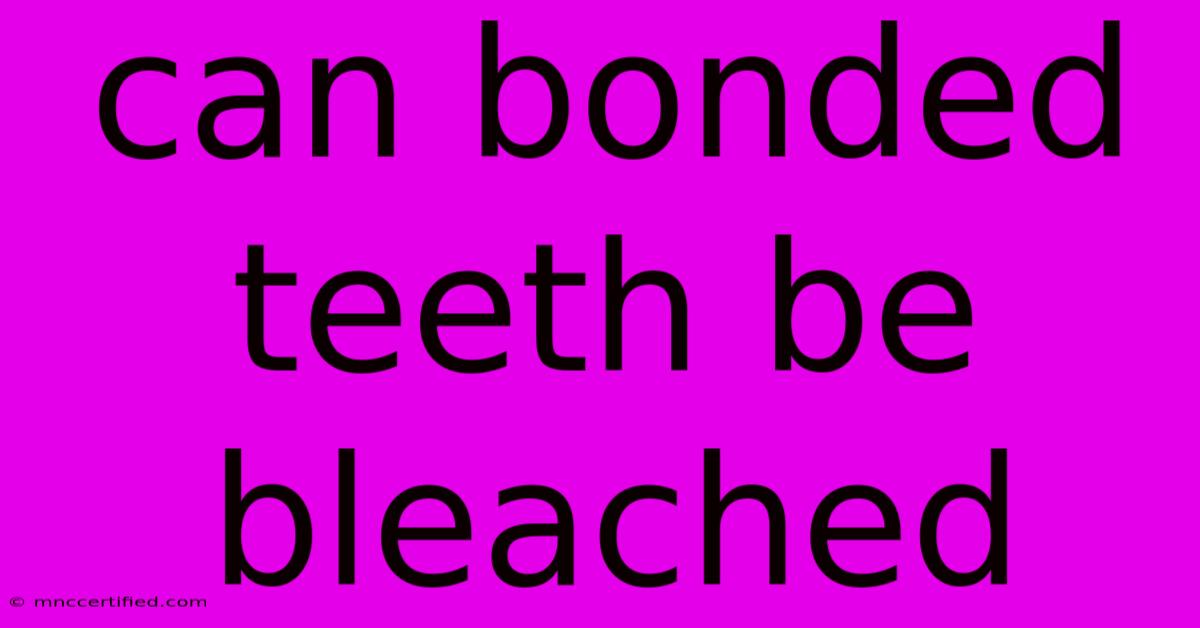Can Bonded Teeth Be Bleached

Table of Contents
Can Bonded Teeth Be Bleached? A Comprehensive Guide
Many people strive for a bright, confident smile. If you've had dental bonding to repair chips, cracks, or discoloration, you might be wondering: can bonded teeth be bleached? The short answer is: it depends. This comprehensive guide will delve into the complexities of bleaching bonded teeth, exploring the factors that influence the outcome and helping you make informed decisions about your smile.
Understanding Dental Bonding and Whitening
Before we address the bleaching question, let's clarify what dental bonding is. Dental bonding uses a tooth-colored resin material to repair and reshape teeth. It's a popular cosmetic procedure for fixing minor imperfections, improving tooth shape, and closing gaps. The resin is applied to the tooth's surface, sculpted to the desired shape, and then hardened with a special light.
Teeth whitening, on the other hand, focuses on lightening the natural color of your enamel. Whitening treatments use bleaching agents (like hydrogen peroxide or carbamide peroxide) to penetrate the enamel and remove stains.
The Bleaching Challenge with Bonded Teeth
The key issue lies in the fact that bonded resin does not respond to bleaching agents in the same way as natural enamel. While your natural teeth might lighten significantly, the bonded material will remain largely unchanged. This can lead to a noticeable difference in color between your natural teeth and the bonded areas, potentially making the bonding more obvious or even creating a less aesthetically pleasing result.
Factors Affecting Bleaching Results
Several factors influence whether bleaching bonded teeth is a viable option:
- Type of Bonding Material: The resin used for bonding comes in various shades. Some may be slightly more susceptible to changes in color with bleaching, but the change will usually be minimal and inconsistent.
- Extent of Bonding: If only a small portion of a tooth is bonded, the color discrepancy might be less noticeable after bleaching. Extensive bonding will show a more pronounced color difference.
- Existing Tooth Shade: If your natural teeth are already quite dark, bleaching might not lighten them sufficiently to drastically reduce the color difference with the bonding.
- Your Dentist's Recommendation: The most crucial factor is your dentist's professional opinion. They will assess your specific situation, considering the type of bonding, its location, and your overall dental health, to determine the best course of action.
Options for Addressing Discoloration
If you're unhappy with the color of your bonded teeth, several options exist besides bleaching:
- Replacing the Bonding: This involves removing the existing bonding and applying new, appropriately matched resin. This guarantees a consistent color and is often the most effective solution.
- Professional Teeth Whitening Before Bonding: If you plan to get bonding in the future, consider professional whitening before the procedure. This ensures a better color match between your natural teeth and the bonding material.
- Veneers: For more extensive discoloration or damage, porcelain veneers may be a better alternative. Veneers are thin shells that cover the entire front surface of your teeth, providing a long-lasting and natural-looking result.
Choosing the Right Path
The decision of whether or not to bleach bonded teeth requires careful consideration. It's crucial to consult with your dentist. They can provide a personalized assessment, discuss the potential risks and benefits of each option, and guide you toward the treatment plan that will give you the beautiful, confident smile you desire.
Remember: Don't attempt any at-home bleaching treatments without consulting your dentist first. Improper bleaching techniques can damage your teeth and lead to irreversible complications.
This comprehensive guide provides valuable information about bleaching bonded teeth. However, it should not replace a consultation with a dental professional. Always seek professional advice before undergoing any cosmetic dental procedure.

Thank you for visiting our website wich cover about Can Bonded Teeth Be Bleached. We hope the information provided has been useful to you. Feel free to contact us if you have any questions or need further assistance. See you next time and dont miss to bookmark.
Featured Posts
-
Bond For Grand Larceny In Sc
Nov 30, 2024
-
Gold Bond Lotion Travel Size
Nov 30, 2024
-
Brothers Bond Whiskey Review
Nov 30, 2024
-
Bonded Collectors Portage Wi
Nov 30, 2024
-
Sheffield Utd Vs Sunderland Live Score
Nov 30, 2024